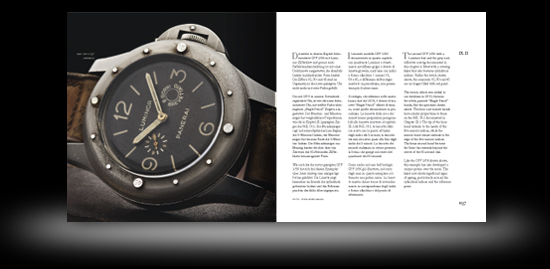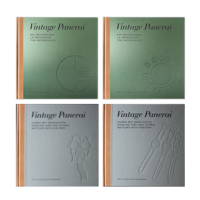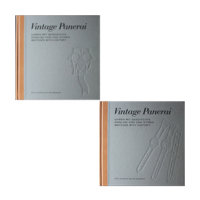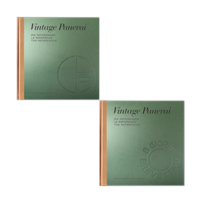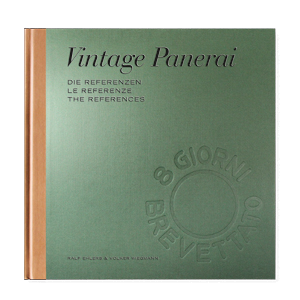Tag: “history1”
How to visualize a frogman’s pencil written diary from 1945?
by Volker on Jan.05, 2025, under General
During the research on the history behind a Ref. 3646 / Type D “Kampfschwimmer” with engraved caseback, we were able to study the diary of the first owner of the watch. This diary survived the last days of the Second World War and the veteran kept it for decades, willed to share it with us and partially featured in chapter II of our book “History2”.
Thanks to the many detailed descriptions (e.g. the water temperature, current, weather conditions and explosive charges carried) which the frogman wrote down and the examination of historical maps of the 1940’s it was possible to analyze his diary entries precisely and visualize his memories to the readers of our book in an impressive way. The collected documents and additional information let this chapter become one of the unique stories behind a Ref. 3646 / Type D “Kampfschwimmer” watch.
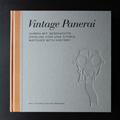 Reading page 83 of “History1” reminds on a part of our research which did happened not often. The frogman wrote the following lines in his diary at the beginning of March 1945:
Reading page 83 of “History1” reminds on a part of our research which did happened not often. The frogman wrote the following lines in his diary at the beginning of March 1945:
“The next morning we set off towards the east in a truck. With unbelievable power, the Russians have pushed thru as far as the [river] Oder in their last offensive. They even managed to build two bridgeheads at Fürstenberg [in November 1961 the city was renamed Eisenhüttenstadt]. Reconnaissance flights tell us that they are putting tremendous amounts of people and material into these bridgeheads”.
Reconnaissance flights? Having this information in mind, we started to search various archives for still existing aerial photographs – maybe the one which the frogmen mentioned in his diary still exists? After the war, some remaining photos were transferred to archives which stored these photos for bomb clearance works. Good luck on the hunt! Guess how easy this search would be? Where to start? To find a aerial photo from the same date, same area and even showing the target, not knowing if its existing at all? We found it – a needle in a haystack – the photo which was shown to the frogmen as their next target.
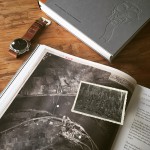 Dated to 1 March 1945, the photo taken by a reconnaissance flight shows one of the pontoon bridges built across the Oder by the Russian troops just shortly before – which became soon later the target for the “Keller Group” just as the frogman wrote it down in his diary. Read more on the diary and various historic documents which helped us to visualize this source of information during our research on a Ref. 3646 / Type D “Kampfschwimmer” watch here.
Dated to 1 March 1945, the photo taken by a reconnaissance flight shows one of the pontoon bridges built across the Oder by the Russian troops just shortly before – which became soon later the target for the “Keller Group” just as the frogman wrote it down in his diary. Read more on the diary and various historic documents which helped us to visualize this source of information during our research on a Ref. 3646 / Type D “Kampfschwimmer” watch here.
The coffee table shot shows page 110-111, chapter II of “History2” next to one of the few original photos of the “Keller Group” taken shortly before their missions at the eastern front (spot some Panerai gear in it). This photo is published on page 94 in the same chapter. The coffee table shot includes also a Ref. 3646 / Type D “Kampfschwimmer”, featured in chapter V of “History2” – the watch of frogman Siegfried Köneke, who was also a member of the “Keller Group”. Read more about this chapter here.
Our two “History” books can be ordered only in our bookstore.
Enjoy reading stories behind these watches!
[Ralf Ehlers & Volker Wiegmann]
A lot to read during the holiday season…
by Volker on Nov.10, 2024, under Allgemein
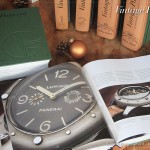 Read about watches and instruments from Guido Panerai & Figlio. Vintage Panerai watches from the 1930’s to the 1960’s are described and photographed in intricate detail for the reader, telling the stories of their first users during their dangerous underwater missions.
Read about watches and instruments from Guido Panerai & Figlio. Vintage Panerai watches from the 1930’s to the 1960’s are described and photographed in intricate detail for the reader, telling the stories of their first users during their dangerous underwater missions.
“History1” (420 pages)
“History2” (480 pages)
“The References” 1930’s-1940’s (696 pages)
“The References” 1950’s-1960’s (696 pages)
As a reference finder, as an addition to your library at home or as a special christmas gift for your friends: our Vintage Panerai books will be a great read for any Panerai collector. Each book comes with an embossed hardback jacket (leather and canvas) in a slipcase, sized 10.2 x 10.2″, trilingual (= German, Italian and English language).
Our four books are in stock and can be shipped immediately – just visit our bookstore. Use the browse by tags function to get further information about the content in each of the four books. Read how to place your order here.
Take your seat and enjoy reading!
[Ralf Ehlers & Volker Wiegmann]
Training scene in the summer of 1944
by Volker on May.26, 2023, under Allgemein
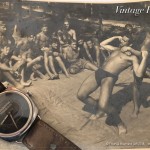 A few days ago we received an interesting photo from the grandson of a German “Kampfschwimmer”. With his support we were able to add the Ref. 3646 / Type B “Radiomir Panerai” into our database last year – read more here.
A few days ago we received an interesting photo from the grandson of a German “Kampfschwimmer”. With his support we were able to add the Ref. 3646 / Type B “Radiomir Panerai” into our database last year – read more here.
Actually, the photo is not new to us. It has been published many years ago in Cajus Bekker’s book “Einzelkämpfer auf See” in 1968 and again in 1978. However, there were never published names of the frogmen in the captions of these two books. Until now: The backside of the original paper photo showed pencil written names of the men which were captured in the photo, which helped us now to identify and link them to other photos in our archives. We have published a photo, taken from a slightly different perspective, showing the same training scene, in chapter V of our book “History2” on page 460.
The photos were taken in the summer of 1944 on the island of San Giorgio (south-west of Venice harbour), showing the training in hand-to-hand combat, which was a fixed part of their training along with other different sporting disciplines. One of the frogmen in the photo is the first owner of the Ref. 3646 / Type B watch on the left.
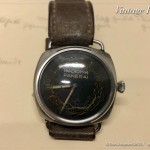 Read more on the activities on the island of San Giorgio in chapter I of our book “History1” including rare historic documents and aerial photographs from the Allied Forces intelligence.
Read more on the activities on the island of San Giorgio in chapter I of our book “History1” including rare historic documents and aerial photographs from the Allied Forces intelligence.
Our special thanks to the frogman’s grandson who provided the photo above (including the additional informations on ist backside in shape of handwritten names), on which he placed the Ref. 3646 / Type B “Radiomir Panerai” of his grandfather. [Ralf Ehlers & Volker Wiegmann]
New entry in our database: an engraved 3646 / Type D
by Volker on Jul.17, 2022, under Allgemein
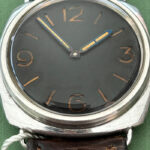 We added another previously unknown watch into our database – yet another piece of the puzzle surfaced, which marks the first entry of a Ref. 3646 / Type D in 2022 and in total the Type D #107 in our records.
We added another previously unknown watch into our database – yet another piece of the puzzle surfaced, which marks the first entry of a Ref. 3646 / Type D in 2022 and in total the Type D #107 in our records.
The “Kampfschwimmer” watch with anonymous sandwich dial appears with a rare engraving on its caseback, bearing the initials of the first owner and the name of the unit he belonged to (Marine Kampfschwimmer 1945).
The inner caseback of the watch (full polished, read more in “The References” 1930’s-1940’s on page 486-487) bears the Rolex SA hallmark, reference and case number known for 3646 / Type D watches. Inside the watch is a Rolex Cal. 618 / Type 1 movement with typical decorations and engravings on the bridges (ROLEX 17 RUBIS / FAB. SUISSE).
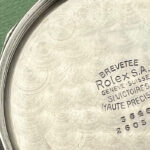 Still sewn onto the soldered lugs is the original leather strap (!) including the large and very rare nickel-plated brass pin buckle. The watch has its original onion shaped winding crown and the typical blued steel hands with original luminous material.
Still sewn onto the soldered lugs is the original leather strap (!) including the large and very rare nickel-plated brass pin buckle. The watch has its original onion shaped winding crown and the typical blued steel hands with original luminous material.
Features of the watch:
Reference: 3646 / Type D
Dial: “Kampfschwimmer” (sandwich, anonymous)
Case number: 2605XX
Movement: Rolex Cal. 618 / Type 1
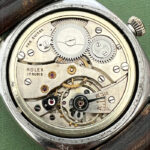 The first owner of the watch took part in a frogmen mission against Russian pontoon bridges across the river Oder at Aurith, near Fürstenberg, in March 1945. You can read about these frogmen missions in our book “History1” in chapter II on page 83-123. The first owner was born in 1924 and passed away in 2000.
The first owner of the watch took part in a frogmen mission against Russian pontoon bridges across the river Oder at Aurith, near Fürstenberg, in March 1945. You can read about these frogmen missions in our book “History1” in chapter II on page 83-123. The first owner was born in 1924 and passed away in 2000.
The watch is accompanied with an interesting documentation of his service during the Second World War and further information about his life, after he was released from British imprisonment in 1945.
If you are interested to buy this watch, please contact the owner directly via e-mail: albert59er@t-online.de
In stock: our coffee table books
by Volker on Dec.06, 2019, under Allgemein
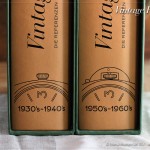 Our four books are in stock and can be shipped immediately – just visit our bookstore. Use the browse by tags function to get further information about the content in each of the four books.
Our four books are in stock and can be shipped immediately – just visit our bookstore. Use the browse by tags function to get further information about the content in each of the four books.
“History1” (420 pages)
“History2” (480 pages)
“The References” 1930’s-1940’s (696 pages)
“The References” 1950’s-1960’s (696 pages)
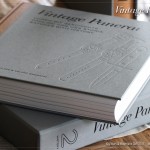 Each of our books comes with a hardback jacket (leather and canvas, black and blind embossed) in a slipcase (canvas, black embossed). The page size is 10.2 x 10.2″ / 26 x 26 cm.
Each of our books comes with a hardback jacket (leather and canvas, black and blind embossed) in a slipcase (canvas, black embossed). The page size is 10.2 x 10.2″ / 26 x 26 cm.
All books are published trilingual (German, Italian and English language). Read how to place your order in our bookstore right here.
Visit our bookstore and enjoy reading soon!
[Ralf Ehlers & Volker Wiegmann]
How the ‘Ambra’ became a transport submarine for SLC units…
by Volker on Aug.26, 2019, under Allgemein
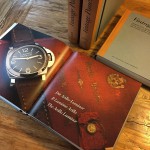 CHAPTER IV @ “History1”: The chapter on Mario Arillo begins with an interview conducted with him in 1989. Numerous as yet unpublished pictures and documents from the family possessions of the famous commander from La Spezia augment the personal descriptions of his submarine missions as a means of transport for Italian Gamma swimmers and the SLC units of the Decima MAS.
CHAPTER IV @ “History1”: The chapter on Mario Arillo begins with an interview conducted with him in 1989. Numerous as yet unpublished pictures and documents from the family possessions of the famous commander from La Spezia augment the personal descriptions of his submarine missions as a means of transport for Italian Gamma swimmers and the SLC units of the Decima MAS.
Mario Arillo’s impressive and moving interview, taken 11 years before he died, holds many interesting details on the missions against the harbours on the north african coast with very rare photos taken aboard the submarine Ambra together with SLC pilots and Gamma frogmen.
CHAPTER IV.I features “The Arillo-Luminor”, a Ref. 6152/1 with “Luminor Panerai” dial and Rolex Cal. 618 / Type 4 movement.
The book “History1″ (420 pages / chapter IV: 165 pages, 106 photos, 7 technical illustrations) is in stock. It can be ordered directly in our bookstore. Enjoy reading!
Exercised to become a frogman at the Baltic Sea…
by Volker on Aug.25, 2019, under Allgemein
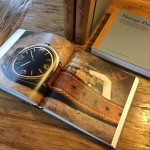 CHAPTER III @ “History1”: The story of Karl-Heinz Kiefer, who received fast-track training in the last months of the Second World War, already provided proof in the first edition of this book (2007 / sold out) about period of use of the rare watch-face version of his Panerai watch, which for a long time had been ascribed to an earlier date. In chapter III of “History1”, his winter training in a toughening-up camp at the Baltic Sea is described in more detail.
CHAPTER III @ “History1”: The story of Karl-Heinz Kiefer, who received fast-track training in the last months of the Second World War, already provided proof in the first edition of this book (2007 / sold out) about period of use of the rare watch-face version of his Panerai watch, which for a long time had been ascribed to an earlier date. In chapter III of “History1”, his winter training in a toughening-up camp at the Baltic Sea is described in more detail.
CHAPTER III.I features “The Kiefer-Radiomir”, a Ref. 3646 / Type D with anonymous “Kampfschwimmer” dial (painted brass) and Rolex Cal. 618 / Type 1 movement.
The book “History1″ (420 pages / chapter III: 55 pages, 39 photos, 3 technical illustrations) is in stock. It can be ordered directly in our bookstore. Enjoy reading!
Reading a frogman’s diary – an unique story…
by Volker on Aug.24, 2019, under Allgemein
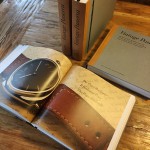 CHAPTER II @ “History1”: For the most part the chapter about Heinz Pape is taken from his surviving diary and presented as a firstperson narrative, with comprehensive supplementation.
CHAPTER II @ “History1”: For the most part the chapter about Heinz Pape is taken from his surviving diary and presented as a firstperson narrative, with comprehensive supplementation.
Thanks to extremely rare aerial photographs of the assignment targets described by him and the examination of several maps it was possible to analyse his diary entries precisely and thus present them to the reader in such an impressive manner – an unique story.
CHAPTER II.I features “The Pape-Radiomir”, a Ref. 3646 / Type D with anonymous “Kampfschwimmer” dial and Rolex Cal. 618 / Type 1 movement.
The book “History1″ (420 pages / chapter II: 91 pages, 44 photos, 3 technical illustrations) is in stock. It can be ordered directly in our bookstore. Enjoy reading!
From elite swimmer to frogman – and back again…
by Volker on Aug.23, 2019, under Allgemein
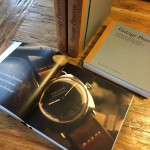 CHAPTER I @ “History1”: The story of the German elite swimmer Heinz Günter Lehmann is told with numerous photos (including maps and documents of the allied secret intelligence), covering the period from his training in Venice to his countless sporting successes on the international stage after the Second World War.
CHAPTER I @ “History1”: The story of the German elite swimmer Heinz Günter Lehmann is told with numerous photos (including maps and documents of the allied secret intelligence), covering the period from his training in Venice to his countless sporting successes on the international stage after the Second World War.
CHAPTER I.I features “The Lehmann-Radiomir”, a Ref. 3646 / Type C with “Radiomir Panerai” dial and Rolex Cal. 618 / Type 1 movement.
The book “History1″ (420 pages / chapter I: 75 pages, 38 photos, 4 technical illustrations) is in stock. It can be ordered directly in our bookstore. Enjoy reading!
Side view: Badessi’s Radiomir watch
by Volker on May.01, 2018, under Allgemein
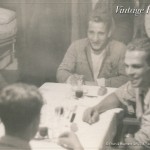 Chapter IV of our book “History1” begins with an interview conducted with Mario Arillo M.O.V.M., commander of the transport submarine for SLC and Gamma units of the Decima MAS, the Ambra. Numerous unpublished photos and documents from the family possessions of the famous commander from La Spezia augment the personal descriptions of his submarine missions in this chapter. Not many photos exist today, taken during a mission in the Second World War – and even less with a Panerai watch to be spotted on a wrist of one of the units of the Mezzi Subacquei.
Chapter IV of our book “History1” begins with an interview conducted with Mario Arillo M.O.V.M., commander of the transport submarine for SLC and Gamma units of the Decima MAS, the Ambra. Numerous unpublished photos and documents from the family possessions of the famous commander from La Spezia augment the personal descriptions of his submarine missions in this chapter. Not many photos exist today, taken during a mission in the Second World War – and even less with a Panerai watch to be spotted on a wrist of one of the units of the Mezzi Subacquei.
In one of these photos, Giorgio Badessi (right), who was one of the six SLC pilots, is clearly wearing his Radiomir watch on the left wrist, sitting on the table together with another SLC pilot, Giorgio Reggioli (in the background), 2nd Officer Zenker (left) and commander Arillo (front) during mission N.A.1.
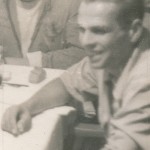 “Operazione N.A.1”, carried out on 12th of December 1942, was the first combined mission with SLC units and combat swimmers of the Gruppo Gamma, in which a total of 16 units were sent out from the transport submarine Ambra to attack allied ships in the Port of Algiers. A scout (“civetta”) at the water’s surface conveyed important instructions by microphone to the Ambra on the seabed. For the first time, the SLC and Gamma units started their mission from a submerged submarine, see sketch on page 324.
“Operazione N.A.1”, carried out on 12th of December 1942, was the first combined mission with SLC units and combat swimmers of the Gruppo Gamma, in which a total of 16 units were sent out from the transport submarine Ambra to attack allied ships in the Port of Algiers. A scout (“civetta”) at the water’s surface conveyed important instructions by microphone to the Ambra on the seabed. For the first time, the SLC and Gamma units started their mission from a submerged submarine, see sketch on page 324.
Read more on Chapter IV of “History1” with 165 pages, 106 photos and seven technical illustrations, here. Mission N.A.1, part of the interview with commander Arillo, is featured in this chapter on page 313-345. Do not miss to read how we were able to get these documents to be published in our book “History1” on page 374-377, with special greetings to La Spezia!

